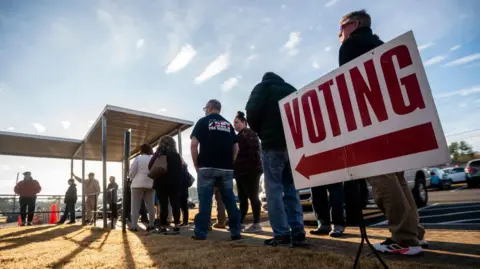 Getty Images
Getty ImagesIt was no ordinary meeting of Georgia’s once-staid election board.
The state panel gathered on Monday for its second all-day meeting to discuss new election rules, hurling accusations at one another while its nonpartisan chairman banged his mallet, calling for order.
The five members had gathered to discuss last week’s 3-2 vote to approve a rule that requires counties to hand count ballots on and after election night.
In recent months, the panel’s new Republican members have approved changes that have sparked warnings this pivotal battleground state could once again find itself at the centre of confusion on and after Election Day.
After narrowly losing Georgia in 2020, Donald Trump and his allies filed lawsuits and spread unfounded allegations of election fraud, with Trump at one point pressuring Georgia’s Republican Secretary of State Brad Raffensperger to “find 11,780 votes” – the margin he lost by in the Peach State.
Trump is currently fighting state criminal charges of conspiring to overturn that defeat in Georgia.
Since then, the drama has continued to play out at the state election board level, with Democratic member Sarah Tindall Ghazal accusing her Republican colleagues of being motivated by “far right-wing beliefs”.
On Monday, Republican member Janice Johnston hit back against the criticism, claiming her character was being “assassinat[ed]”.
Sowing seeds of doubt
Last Friday’s vote on the hand counting of ballots in Georgia came after weeks of objection from local election officials.
Poll supervisors in Georgia told the BBC the new rule could cause problems on and after Election Day, including delays in results reporting and human errors.
The new measure requires poll workers to hand count ballots on election night – or in some cases, the day after – to confirm that the number of paper ballots matches the amount tabulated by the machine.
Janelle King, a Republican who voted in favour of the rule, told the BBC the measure aims to ensure the accuracy of election results.
She noted that the rule does not require poll workers to count the actual results on the ballots, only the amount of papers.
“Our voters – I think they care more about accuracy than speed,” she said. “It’s the best practice.”
Other election officials disagreed.
“It’s a recipe for disaster,” Anne Dover, a Republican elections director in Georgia’s Cherokee County, told the BBC.
Dover says the new election rules are being pushed by those who fear the 2020 election was fraudulent. She says her own husband has questioned the results of the election four years ago in other parts of the state.
“They’re just not in touch with how hard elections officials work to do a good job,” she said.
Ethan Compton, an elections supervisor in Irwin County, Georgia, says the new rule will slow down results reporting and “leave room for chaos, and chaos can sow seeds of doubt”.
Compton worries that the aftermath of the election in Georgia in 2024 could mirror the events of four years ago, when Trump and his allies cited hours of absentee-ballot counting as evidence of voter fraud, undermining public confidence in the election process.
 Peyton Mariah Photography
Peyton Mariah Photography‘Partisan football’
This isn’t the first change of voting rules to spark uproar in an election year. Democrats triggered lawsuits four years ago after they broadened use of ballot drop boxes in Wisconsin and expanded postal voting in Pennsylvania.
But the difference in Georgia is that criticism is coming from both sides of the political aisle.
Georgia’s State Election Board comprises three Republicans, one Democrat and a chairman appointed by the Republican governor.
The role was historically procedural and nonpartisan, but in the aftermath of the 2020 election, the panels have emerged as a political lightning rod.
“Now, the job has turned into something that’s like partisan football,” said Gowri Ramachandran, director of elections and security at the Brennan Center for Justice, a liberal non-profit.
The state board was previously chaired by Georgia’s secretary of state, but Raffensperger’s fellow Republicans pushed him out after the 2020 election, a move critics say was revenge for his defence of the election results.
Since then, several Trump-aligned Republicans have joined and won a majority on the board: Ms King, Ms Johnston and former Republican state senator Rick Jeffares.
During meetings, the board’s three new Republican members have advocated for a number of changes to the state’s elections, including a rule passed earlier this year that allows local election boards to conduct “reasonable inquiries” into election results before certifying them.
Ms King argues the rule will lead to “an increase in certifications” because board members can examine documents themselves.
“We want to make sure they have as much confidence in that election as possible,” she said.
Trump has personally thanked Ms King and her two newly appointed Republican board members by name, saying at a rally in Atlanta in August that the trio were “pit bulls fighting for honesty, transparency and victory”.
Officials and election administration experts said that although the state board’s rule changes could bring disruption in November, they believed Georgia’s broader voting laws would ultimately pave the way for a secure presidential election.
Some also said they remained concerned about the damage that could be done to the public’s trust in the election system.
Dover said the misinformation that circulated during the last election led to bomb threats and voicemails harassing election officials.
Peter Simmons, a Georgia policy strategist with the non-profit Protect Democracy, which describes itself as nonpartisan, noted that even though Trump’s allegations of widespread fraud in 2020 have never been substantiated, a large portion of Americans still believe his claims.
“That’s essentially what has inspired this set of actions [in Georgia] today,” Mr Simmons said.

More on US election




